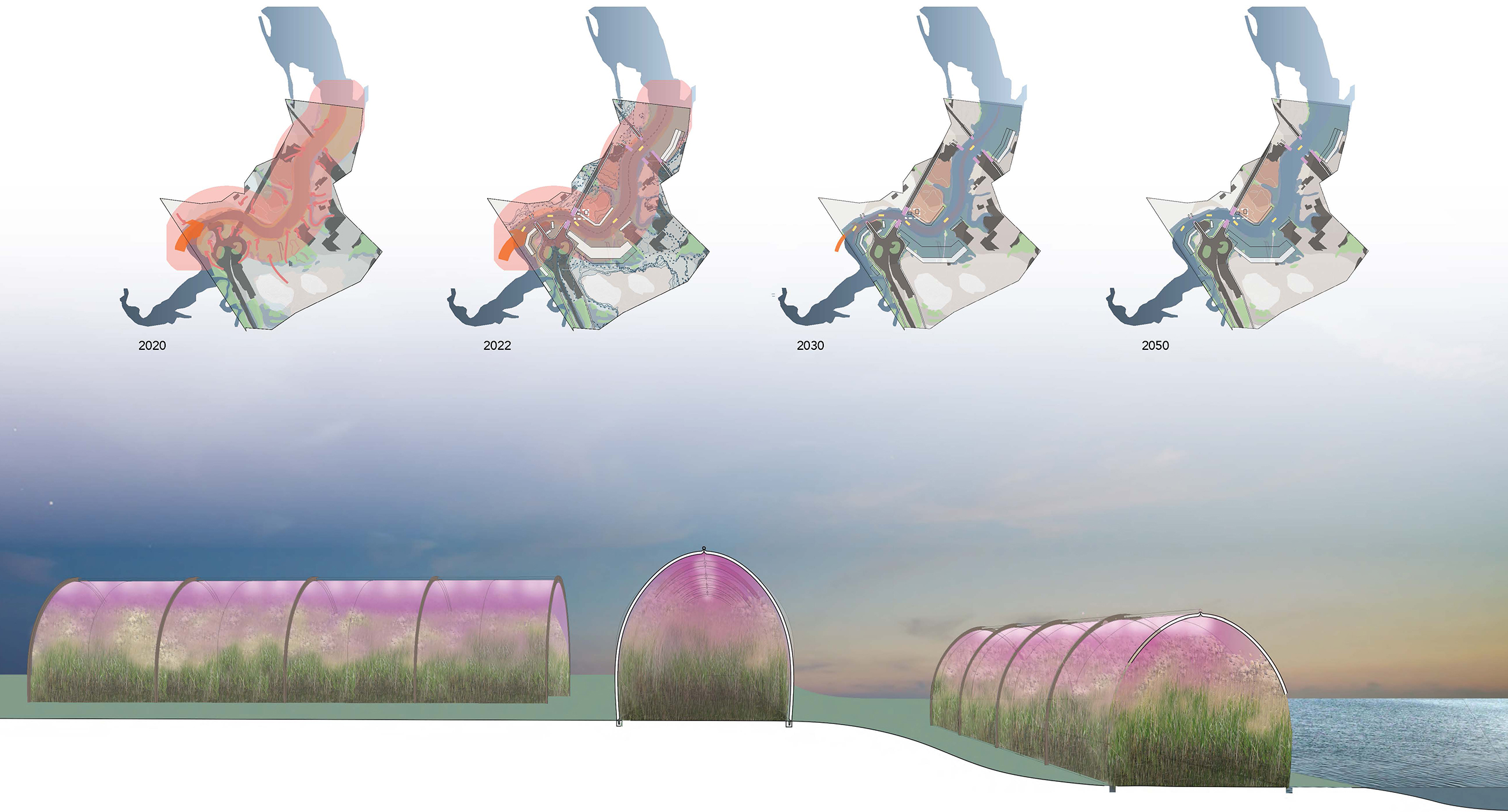Northeastern University recently held its annual Research, Innovation and Scholarship Expo. Known as RISE, the event brings together both faculty and student research at one important event – this year, in a digital format. The event features hundreds of presenters who have been nominated and vetted to be part of the expo, and share their breadth and depth of research, entrepreneurship, and scholarship with guests and judges. At the end of the event, the judges submit their ratings and the top award winners are then recognized. College of Arts, Media and Design (CAMD) students, especially from our School of Architecture, have always been well-prepared and positioned for success at RISE; their dedication and time in studio, at critiques, and in developing large scale, thoroughly researched projects have helped them develop the skill set for independent research and innovative thinking.

This year, several School of Architecture students at both the undergraduate and graduate level were recognized for their incredible work. Winners included: Anastasia Leopold, Alex Bondi, and Kalpana Bhandari with the RISE Award in Research (one of the event’s major award categories); Elizabeth Farrell with the Outstanding Research Award in Humanities and Arts; George Hajjar, Natalie Clark, Lin Xu, Noah Yu, and Justin Chiovitti with the Interdisciplinary Topics, Centers and Institutes Award; and Estuardo Viallatoro Castaneda with the Design Award, one of RISE’s new Focus Awards that was sponsored by CAMD.
The team project that earned the RISE Award in Research, entitled Invasive Infrastructure, is a research-based system to utilize existing ecology as green infrastructure for resilience and public health. The group of Architecture students – Anastasia Leopold (undergraduate), Alex Bondi (undergraduate), and Kalpana Bhandari (graduate) – proposed a series of discrete interventions utilizing Phragmites australis to restore and strengthen marshland while addressing multiple contaminant types across various timescales and threats. In Boston’s Neponset River Estuary – which has become polluted, depleted of native species, and put under serious threat from toxic chemical buildup – these interventions include a series of temporary and flexible inputs along current coastal infrastructure that will act as natural filters to remove toxic chemicals from runoff and industry before they are released into the coastal water system. Implementing these interventions will also generate new marsh that will increase the productivity of the estuary and strengthen the current coastline. View RISE poster, with full project description, here.
Elizabeth Farrell, a graduate student in the School of Architecture, earned the Outstanding Research Award in Humanities and Arts for her project An Everyday Utopia: Water, Energy, Waste in Haiti. Elizabeth – as well the students in the two winning projects to follow – was part of the site-focused design studio led by Killion Mokwete, CAMD Lecturer and RIBA Chartered Architect, that recently traveled to Arcahaie, Haiti (read more about that experience here). Her project proposes a utopian vision for Haiti – a country replete with culture, life, and vibrancy – in the form of a living, working, and learning utopia that integrates all three of these infrastructural challenges within a unified framework. Elizabeth proposes an integrated and self-sustaining approach to development that makes use of renewable power sources, local water systems and an informal approach to waste management. Through providing new skills and job opportunities to Haitians, the project aims to strengthen the local economy while simultaneously bringing vitality back to a country in transition. View RISE poster, with full project description, here.
Architecture graduate student Estuardo Viallatoro Castaneda was recognized with the RISE Design Award (sponsored by CAMD). Entitled Women: Head and Heart of the Haitian Economy, his project proposes a set of essential services and complementary programs geared towards the empowerment of Haitian women, tied to the spaces and sites where they work and interact on a daily basis, to relieve some of the daily pressures they face to perform their economic activities. Through a combination of spatial and social interventions within Arcahaie’s central market and its surrounding areas, the project aims to provide a platform to improve the current working conditions of informal vendors. The proposal builds upon frameworks, such as the Sirleaf Market Women’s Fund in Liberia and the Fonkoze Foundation in Haiti, to identify the needs of women working around the marketplace, with the aim of bringing greater visibility to the hidden labor of women that forms an essential component of Haitian society. View RISE poster, with full project description, here.
Last, a team of graduate students – George Hajjar, Natalie Clark, Lin Xu, Noah Yu, Justin Chiovitti – were recognized with the Interdisciplinary Topics, Centers and Institutes Award for their project Disaster Relief Planning Organization (DRPO). DRPO is a non-profit organization that connects experts in architecture, planning, and emergency response consulting with local governments and like-minded partners in vulnerable Haitian communities, empowering them through the creation of emergency response plans. According to their project, preemptive action and community engagement yield effective plans that are locally specific and feasible to implement, while also teaching skills to develop more sustainable communities in the future. View RISE poster, with full project description, here.
Congratulations to these students and all of the RISE participants! To view all of the RISE:2020 winners, click here.


